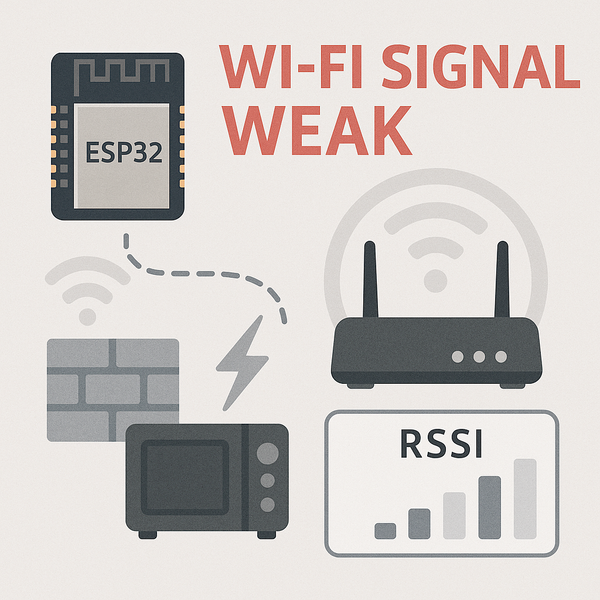ESP32 Wi-Fi Signal Weak
Improve Wi-Fi reliability by addressing weak signal issues on ESP32 boards. Learn how distance, obstructions, antenna orientation, and interference affect connectivity, and follow practical steps to boost signal strength for stable performance.
Common Causes
- 🏠
Physical Obstructions or Distance
Walls, floors, and furniture between the ESP32 and Wi-Fi access point can significantly degrade signal strength.
- 📶
Weak Antenna or Poor Orientation
Boards with onboard antennas may perform poorly if improperly oriented or enclosed in metal/plastic cases.
- 📡
Interference from Other Devices
Nearby electronics, especially those operating on 2.4 GHz (like microwaves or Bluetooth devices), can disrupt Wi-Fi signals.
Symptoms
Wi-Fi Only Works Near Router
The ESP32 connects reliably only when positioned very close to the access point.
Frequent Disconnects at Range
Connection drops occur intermittently when the ESP32 is placed further from the router or behind walls.
Slow or Failed Data Transfers
HTTP requests, MQTT messages, or OTA updates fail due to poor signal integrity or repeated retransmissions.
Solutions
Move ESP32 Closer to the Router
Reduce physical distance and remove obstructions to improve signal strength and reduce dropouts.
Reorient or Replace the Antenna
Angle the onboard antenna away from metal surfaces, or use a development board with an external antenna connector for better performance.
Avoid 2.4 GHz Interference
Move the ESP32 away from devices like cordless phones, Bluetooth speakers, and microwave ovens that can interfere with Wi-Fi.
More Details
ESP32 Wi-Fi Signal Weak #
If your ESP32 only connects when it’s near the router - or drops off the network as soon as you move it a few feet away - you’re likely dealing with weak signal strength.
The ESP32 uses a 2.4 GHz Wi-Fi radio, which is sensitive to distance, interference, and antenna orientation. Boards with onboard antennas can be especially finicky in enclosed or obstructed environments.
Common Scenarios #
- ESP32 connects when it’s on your desk, but not across the room
- It disconnects randomly when placed in a box, case, or outdoor location
- You see repeated reconnection attempts in the serial monitor
- Data uploads or downloads are slow or fail entirely
Why It Happens #
📏 Too Far from Router #
Wi-Fi signal strength decreases exponentially with distance. Even a few meters - especially through walls - can reduce signal quality below usable levels.
🧱 Obstructions and Orientation #
Metal enclosures, thick walls, or even PCBs in the wrong orientation can block or reflect RF signals. If the antenna is embedded in the PCB, position matters.
📡 Nearby Interference #
Devices like microwaves, Bluetooth speakers, and cordless phones can degrade 2.4 GHz signals. Even other Wi-Fi devices on the same channel can add congestion.
How to Improve Signal Strength #
✅ 1. Move the ESP32 Closer to the Access Point
Reduce the number of walls and the overall distance between the ESP32 and your Wi-Fi router. Line-of-sight is ideal for testing.
✅ 2. Improve Antenna Position
Tilt the board or case so the antenna isn’t obstructed or flush against metal. For ESP32s with u.FL or SMA connectors, consider using an external antenna.
✅ 3. Avoid Interference Sources
Keep the ESP32 away from microwaves, fluorescent lights, cordless phones, or any dense cluster of electronics operating on 2.4 GHz.
✅ 4. Use a Wi-Fi Analyzer Tool
Use apps or tools to analyze signal strength and channel usage. Move to a less congested Wi-Fi channel if needed.
Code Tip: Check RSSI #
You can measure Wi-Fi signal strength programmatically:
long rssi = WiFi.RSSI();
Serial.print("Signal strength (RSSI): ");
Serial.print(rssi);
Serial.println(" dBm");Typical values:
- -30 dBm = excellent
- -70 dBm = fair
- -90 dBm = unusable
Summary #
Weak Wi-Fi signal is one of the most common - and fixable - ESP32 networking problems. Better placement, orientation, and avoidance of interference can significantly boost reliability.

Quick Navigation
Additional Resources
Still Stuck with an ESP32 Issue? Let's solve it together.
Our interactive troubleshooting wizard will guide you through common ESP32 problems and their solutions, step by step.